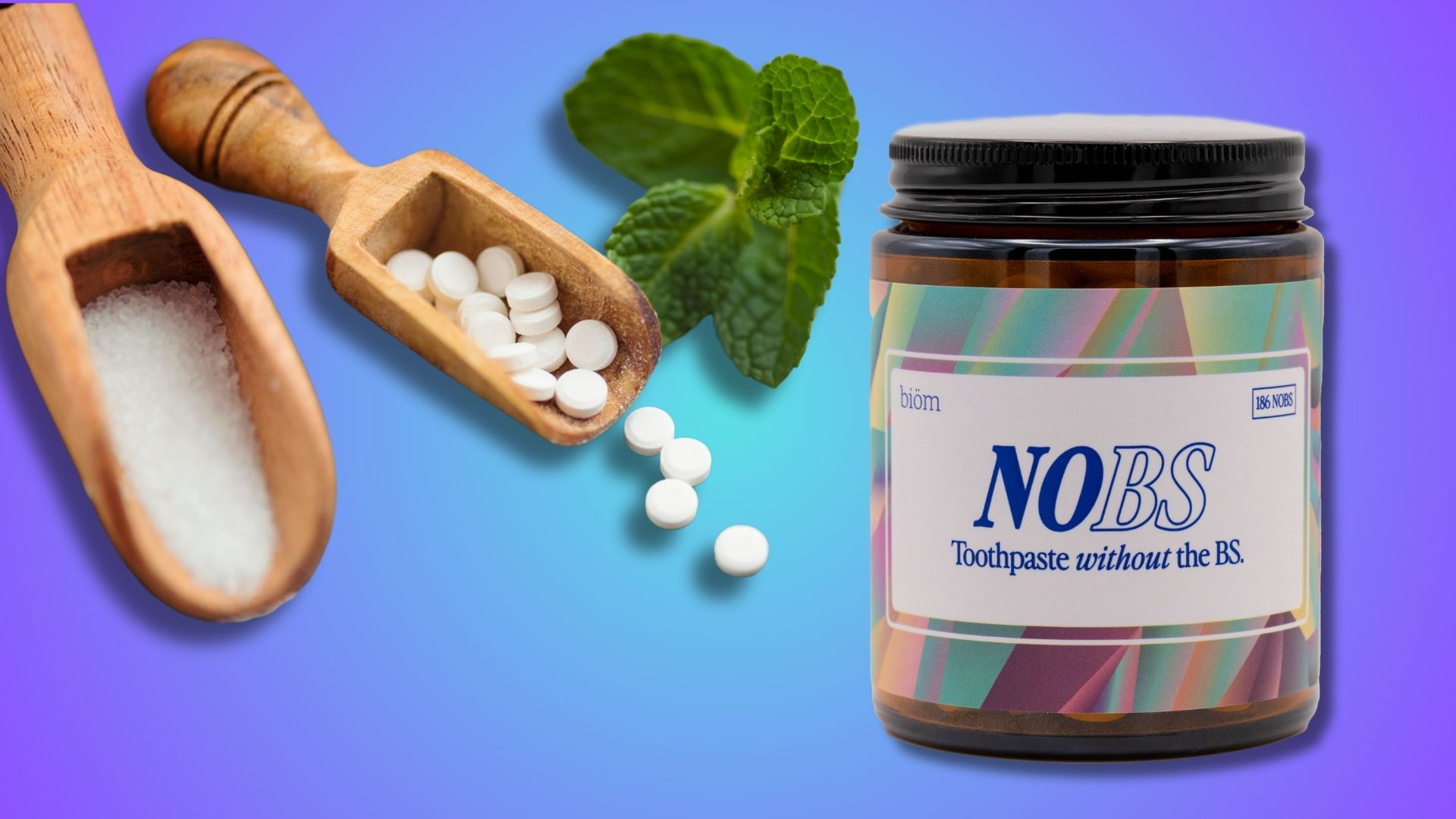Does Nano Hydroxyapatite Work?
Yes, nano hydroxyapatite has been shown to effectively strengthen teeth, prevent tooth decay, and reduce sensitivity through the process of enamel remineralization.
This material mimics the natural components of your tooth enamel, thereby facilitating the natural restoration process of the teeth.
Notably, nano hydroxyapatite toothpaste is an ideal alternative to fluoride toothpaste, and it is effective at:
-
strengthening teeth
-
reduce sensitivity
-
and preventing plaque buildup.
Keep reading to learn everything you need to know about nano hydroxyapatite in toothpaste and why it works better than anything you've tried before.
What is nano hydroxyapatite?
Nano hydroxyapatite is a derivative of a naturally occurring organic material called calcium phosphate.
Thanks to its function as a biocompatible mineral, nHA has many uses in medicine, including the ability to stimulate bone growth and strengthen enamel.
In fact, one of the most popular uses of nano hydroxyapatite comes from regenerative dentistry in the form of remineralizing toothpaste that can help to remineralize demineralized enamel.
These nano-hydroxyapatite particles penetrate the microscopic pores of your tooth enamel, replenishing minerals and thereby enhancing the teeth's condition and resistance against damage.
Studies suggest that nano-hydroxyapatite can significantly improve:
-
tooth enamel quality
-
reduce sensitivity
-
and aid in preventing decay.
Furthermore, because it is a natural material, nano hydroxyapatite is safe and effective for people of all ages.
Where Nano Hydroxyapatite Comes From
Nano hydroxyapatite, also known as nHA, is a synthetic version of the naturally occurring calcium apatite found in your tooth enamel and saliva.
It is produced through controlled chemical synthesis methods in laboratory settings. This involves carefully regulating the precipitation of calcium and phosphate ions to form nano-sized hydroxyapatite particles.
These particles mimic the structure and composition of natural hydroxyapatite, making them suitable for a variety of biomedical applications, particularly in dentistry and orthopedics.
In vitro study after in vitro study shows that nano hydroxyapatite has high bioavailability.
This means that your body is able to use nano medical hydroxyapatite more easily than calcium phosphate.
Nano Hydroxyapatite Uses
While nano-hydroxyapatite was first patented for use in toothpaste by Sangi Co Ltd in 1978, it also has many different applications, such as:
-
Nano medical hydroxyapatite toothpaste: to promote a healthy enamel surface area
-
Bone grafts: to reconstruct periodontal bone defects
-
Crown bonding: to reinforce glass ionomers
-
Drug delivery systems: to improve medication bioavailability
-
Anti-tumor effects: to safely treat of cancers without adverse effects
-
Wound healing: to speed up the healing process by introducing calcium
-
Surface coating: to improve clinical outcomes associated with artificial implants
-
Scaffolding: to treat and correct bone defects
These nano hydroxyapatite uses play a crucial role in improving patient outcomes across various medical fields. Its biocompatibility and ability to mimic bone and enamel make it highly valuable in dentistry and regenerative medicine.
Nano Hydroxyapatite and Remineralization
Cavities, also known as dental caries, are common dental problems characterized by structural damage to the teeth. In fact, the World Health Organization reports they're the most common disease in the world.
Cavities form due to a complex interplay of different factors within your oral microbiome. You see, we all have harmful bacteria naturally present in our mouths that form a sticky film called "dental plaque" on our teeth. When we consume sugary foods or acidic fruits, for example, the bacteria feed on the sugars and then produce acid as a byproduct.
Then, the acid produced attacks our enamel, initiating a process that we call demineralization. Over time, demineralization leads to the initial stage of cavity formation which can result in the development of small openings in our enamel. The openings get progressively larger and eventually penetrate deeper into the tooth, causing symptoms like sensitivity and discomfort.

To reverse tooth decay, we use tools like nano hydroxyapatite toothpaste to stimulate a process called remineralization (aka the opposite of demineralization).
It works by delivering nano-sized particles of hydroxyapatite, the main mineral in enamel, to the tooth surface. These particles integrate with enamel, replenishing lost minerals and encouraging crystal growth, strengthening enamel and making it more resistant to acid attacks.
Additionally, nHA smooths surface roughness, reduces plaque buildup, and promotes long-term remineralization, offering a comprehensive solution for dental health.
Its biocompatibility and effectiveness make it a valuable tool for preventing tooth decay and maintaining optimal oral hygiene.
Benefits of Nano Hydroxyapatite Toothpaste

Nano hydroxyapatite toothpastes and nano hydroxyapatite toothpaste tablets are making waves for apatite functions to strengthen your enamel surface and increase the mineral density of your teeth.
This process makes your teeth stronger and glossier while also decreasing your chances of tooth decay, leading to a radiant smile!
Cavity Prevention
While hydroxyapatite does not have the same FDA approval for dental caries prevention as fluoride and the fact that you cannot remineralize a cavity once it has fully formed, studies show that nano hydroxyapatite does indeed help remineralize initial caries lesions.
This process can stimulate bone growth leading to reduced chances of developing decayed enamel.
Reduce Teeth Sensitivity
Even beyond caries prevention, synthetic hydroxyapatite is an effective desensitizing agent. Research shows that it is a safe material for reducing dentin hypersensitivity.
By depositing minerals into the protective layer of your teeth, hydroxyapatite toothpaste can make a significant difference in your ability to tolerate acidity, temperature, and sugar.
Healthy Oral Microbiome
A healthy mouth has a unique environment of bacteria in it. Using synthetic hydroxyapatite is helpful in reducing the growth of bad bacteria while sparing the good bacteria that protect your teeth.
Additionally, many common agents in oral care can disrupt your microbiome, such as:
-
chlorhexidine
-
hydrogen peroxide
These ingredients may lead to issues like sensitive teeth and dry mouth. Nano hydroxyapatite toothpaste protects your mouth from these negative effects.
Fights Bad Bacteria
Nano hydroxyapatite toothpaste, unlike fluoride, has unique antibacterial properties. By selectively killing off certain strains of bacteria that disrupt your mouth, hydroxyapatite protects your teeth and gums.
Prevent Dental Fluorosis
Excessive use of fluoride products in dental care causes the discoloration of your teeth through a condition called dental fluorosis.
Therefore, switching to a more natural formula, such as nano hydroxyapatite toothpaste can help preserve the beauty of your smile.
Does nano hydroxyapatite prevent cavities?
Although hydroxyapatite cannot directly reverse cavities, research indicates that it can aid in the remineralization process and prevent the progression of tooth decay.
Toothpastes containing hydroxyapatite and nano hydroxyapatite provide calcium and phosphate ions that can integrate into the tooth structure, forming a protective layer against further demineralization.
This process plays a critical role in preventing and treating tooth decay as hydroxyapatite can replenish the mineral loss in enamel, thus restoring and strengthening your teeth.
Further, the use of hydroxyapatite-based products, including toothpastes, offers an opportunity to restore minerals in teeth and prevent decay in a safe way. Conversely, the excessive use and ingestion of fluoride products can lead to adverse effects in some individuals.
So, while hydroxyapatite and nano hydroxyapatite may not directly reverse cavities, they serves as valuable tools in promoting oral health by remineralizing enamel and preventing decay.
Is nano hydroxyapatite safe?

Yes, hydroxyapatite, alongside its smaller cousin nano hydroxyapatite, is safe to use in toothpaste. In fact, research indicates that nano hydroxyapatite toothpaste may have fewer safety concerns compared to fluoride toothpaste.
Nano hydroxyapatite particles and hydroxyapatite particles do not induce toxicity the way overconsumption of fluoride can. This is particularly important for certain populations such as:
-
pregnant women
-
children
-
people prone to tooth decay and cavities
-
people who live in environments with high fluoride concentrations in the water
This is likely because nano hydroxyapatite particles are biomimetic and safe as they are already a substance naturally present in our teeth, which makes them less likely to cause any harm when use.
Therefore, choosing nano hydroxyapatite toothpaste tablets can be your ideal step, as they are safe for children and offer a gentle yet effective approach to oral health for everyone.
What's the best concentration of nano hydroxyapatite in toothpaste?
The best concentration of nano hydroxyapatite in toothpaste is 5%.
For example, one double-blind study found that 5% nano hydroxyapatite toothpaste showed significant anti-caries remineralization effects on enamel.
Another study showed that 5% and 10% nano hydroxyapatite dentifrices were equally effective at remineralizing teeth.
While some studies show the efficacy of 10% nHA toothpaste, one potential issue is the aggregation property of nano hydroxyapatite at higher concentrations which may reduce bioavailability.
Because of this aggregation property, a recent study found that 5% nano hydroxyapatite is more effective at remineralization than 10%.
Further, because nano hydroxyapatite is such an expensive material, it is likely that brands formulating it at a 10% concentration are using the cheapest version: needle-shaped nano hydroxyapatite.
As of 2024, needle-shaped nHA is banned in the European Union due to safety concerns.
In contrast, biöm uses safe 5% rod-shaped nano hydroxyapatite in our toothpaste tablets, and all of our toothpaste is manufactured in FDA-compliant facilities.
Nano Hydroxyapatite vs. Fluoride Toothpaste

While fluoride is the historical gold standard in cavity prevention, studies suggest that nano hydroxyapatite is equally as effective as fluoride, if not more, at remineralization.
Interestingly, one study even found that nano hydroxyapatite was more effective than a comparable fluoride varnish.
In this section, we'll explore the differences between the two ingredients.
MECHANISM
While fluoride toothpastes work by depositing fluoride ions into your enamel, fluoride free toothpaste with hydroxyapatite works by depositing naturally beneficial materials like calcium and phosphate ions into your enamel.
Since your enamel is already made of calcium and phosphate, among other materials, synthetic hydroxyapatite reinforces the existing tooth structure.
EFFICACY
Both fluoride and nano hydroxyapatite toothpaste are effective at supporting good oral health through:
-
reducing teeth sensitivity
-
promoting dentine remineralization
-
preventing tooth decay
-
supporting the oral microbiome
-
and increased enamel surface hardness.
Further, studies show both compounds have similar comparative efficacy for remineralizing teeth, lesion depth reduction, and inhibiting enamel caries progression.
SAFETY
Since nano hydroxyapatite is a naturally occurring material that your body already makes, there are no safety or toxicity concerns.
On the other hand, fluoride is a controversial ingredient in dentistry for its role in negatively affecting fetal brain development and causing dental fluorosis.
AVAILABILITY
Fluoride toothpastes are more widely available and can be found at any grocery store, drug store, or online. Hydroxyapatite toothpaste brands are less widely available and more likely to be found online than in retail stores.
Is hydroxyapatite as strong as fluoride?
No, fluoride is stronger and more resistant to demineralization than hydroxyapatite.
However, hydroxyapatite is still just as effective at remineralization and perhaps even better at soothing hypersensitivity because it's the natural material that your teeth are already made of.
So, while fluoride is renowned for its strength, hydroxyapatite stands out for its natural affinity with the teeth and its potential to excel in specific oral health aspects. That's why many people suggest that both nano hydroxyapatite and hydroxyapatite are better than fluoride.
Of course, you can always use nano hydroxyapatite and fluoride together in your oral care routine if you wish.
Should I use nano hydroxyapatite toothpaste?

Yes, you should use nano hydroxyapatite toothpaste into your oral care routine.
It really does work to:
-
whiten teeth
-
soothe hypersensitivity
-
strengthen teeth
-
and prevent tooth decay.
In fact, studies show that nano hydroxyapatite toothpaste is just as effective as fluoride for protecting teeth. However, nHA is considered safer than fluoride as it poses no risk of fluorosis, toxicity and skeletal fluorosis that can occur from excessive fluoride intake.
Therefore, consider using nano-hydroxyapatite toothpaste in your oral hygiene, as it provides compact and effective remineralization that is essential for maintaining a good oral health.
Is it safe for kids?
Yes, nano-hydroxyapatite is safe for kids and is often recommended as a fluoride alternative in oral care products. It is biocompatible, non-toxic, and does not pose harmful risks when used in toothpaste.
Studies show it effectively restores lost minerals in enamel, helping to strengthen growing children’s teeth without the risk of fluorosis from fluoride.
nHA also helps reduce cavities, strengthen enamel, and protect against tooth decay, which are key for maintaining children's oral health. Its gentle nature makes it ideal for kids who may accidentally swallow toothpaste while brushing.
Overall, nano-hydroxyapatite is a safe and effective choice for children’s oral hygiene routines.
IS NANO HYDROXYAPATITE BANNED IN THE EU?
No, nano hydroxyapatite is not banned in the EU.
As of March 2023, the EU Scientific Committee of Consumer Safety determined "hydroxyapatite (nano) safe when used at concentrations up to 10% in toothpaste, and up to 0.465% in mouthwash".
This conclusion came after much research and debate over the safety and potential health risks of nano sized particles in oral cosmetics.
Summary: Is nano hydroxyapatite effective?

The answer is straightforward: Yes! Nano hydroxyapatite is indeed effective.
At a high level, hydroxyapatite toothpaste is effectively works by:
-
supporting remineralization
-
strengthening enamel
-
alleviating hypersensitivity
-
and offering numerous other benefits.
Therefore, many people prefer nano hydroxyapatite toothpaste to fluoride toothpaste because it's a safe and natural alternative with equal efficacy.
All in all, choosing nano hydroxyapatite toothpaste tablets can be your ideal step toward a safer and more effective oral care routine.
Frequently Asked Questions
Does nano hydroxyapatite really work?
Yes, nano hydroxyapatite has been extensively studied and shown to be effective in remineralizing tooth enamel and preventing early stage of cavities. Research indicates that nano hydroxyapatite toothpaste can replenish lost minerals, promote crystal growth, and enhance the acid resistance of enamel, leading to stronger and healthier teeth. Many studies have demonstrated its ability to reduce enamel surface roughness, inhibit plaque formation, and provide long-lasting remineralization benefits. Overall, the evidence supports the efficacy of nano hydroxyapatite toothpaste as a valuable tool for maintaining optimal dental health and preventing tooth decay.
How long does it take for nano hydroxyapatite to work?
Nano hydroxyapatite toothpaste begins working immediately upon application. Its nano-sized particles can quickly integrate with the enamel, replenishing lost minerals and promoting remineralization. While some benefits, such as smoother enamel surface and reduced plaque buildup, may be noticeable shortly after use, the full effects of long-term remineralization typically become more apparent with consistent use over time. Therefore, while immediate benefits are evident, continued use of nano hydroxyapatite toothpaste is recommended for optimal dental health and ongoing protection against tooth decay.
Does nano hydroxyapatite fix cavities?
Nano hydroxyapatite toothpaste can aid in remineralizing and repairing early-stage cavities by replenishing lost minerals in the enamel and promoting crystal growth. However, it is important to note that the extent to which nHA can "fix" cavities depends on various factors, including the severity of the cavity and the individual's oral hygiene habits. In some cases of minor enamel damage or early cavities, consistent use of nHA toothpaste alongside other preventive measures may help halt the progression of decay and promote tooth remineralization. However, for more advanced cavities, dental professionals intervention such as fillings may be necessary to restore the tooth's structure and function.
What are the disadvantages of hydroxyapatite?
There are no known disadvantages or side effects of nano hydroxyapatite in toothpaste. Research states that there is no literature reporting any systemic or adverse effects of hydroxyapatite containing toothpastes. That's why many people are turning to nano hydroxyapatite toothpaste as a safe, non-toxic alternative to fluoride toothpaste.
Is hydroxyapatite bad for your teeth?
No, hydroxyapatite (nHA) is not bad for your teeth; in fact, it plays a crucial role in maintaining dental health by providing strength and protection to the enamel. Nano hydroxyapatite toothpaste, which contains synthetic forms of hydroxyapatite, has been shown to be safe and effective in promoting remineralization and strengthening enamel. Its effectiveness in enhancing enamel remineralization underscores its potential as a valuable component in oral care products, offering a promising avenue for maintaining dental health.
What is the mechanism of action of nano hydroxyapatite?
Nano-hydroxyapatite works by mimicking the natural structure of tooth enamel, which is primarily composed of hydroxyapatite crystals. It fills microscopic cracks and bonds to the enamel, restoring lost minerals and strengthening the tooth surface. This remineralization process helps protect against cavities, reduce sensitivity, and improve overall tooth health.
Does nano hydroxyapatite reverse cavities?
Nano-hydroxyapatite can help reverse early-stage cavities by remineralizing and repairing the enamel. It fills in tiny cracks and lesions caused by demineralization, restoring lost minerals and strengthening the tooth surface. However, it cannot reverse cavities that have progressed into deeper layers of the tooth.
Does nano hydroxyapatite regrow enamel?
Nano-hydroxyapatite does not regrow enamel but helps restore and repair it by filling in microscopic cracks and replacing lost minerals. It mimics the natural structure of enamel, strengthening and smoothing the tooth surface. This remineralization process makes the enamel more resistant to future damage.
What is the difference between hydroxyapatite and nano-hydroxyapatite?
The main difference between hydroxyapatite and nano-hydroxyapatite lies in their particle size. Nano-hydroxyapatite has much smaller particles, allowing it to better penetrate the tiny cracks and pores in tooth enamel for more effective remineralization. This smaller size makes nano-hydroxyapatite more bioavailable and efficient at repairing enamel and reducing tooth sensitivity compared to regular hydroxyapatite.
How effective is nano-hydroxyapatite?
Nano-hydroxyapatite is highly effective in oral care as it mimics the natural structure of tooth enamel, helping to repair microscopic cracks and remineralize teeth. Studies show it can strengthen enamel, reduce sensitivity, and protect against cavities. It’s a proven alternative to fluoride, offering similar benefits without potential risks for certain individuals.
How do I know if a cavity is Remineralizing?
A remineralizing cavity often appears as a chalky white or light-colored spot that feels smooth to the touch. Over time, the spot may become harder and less noticeable as minerals rebuild the enamel. Regular dental check-ups and using remineralizing products like nano-hydroxyapatite can confirm progress.
What are the negatives of hydroxyapatite toothpaste?
There are no known negatives or side effects of nano hydroxyapatite in toothpaste. Research states that there is no literature reporting any systemic or adverse effects of hydroxyapatite containing toothpastes. In fact, that's why many people are turning to nano hydroxyapatite toothpaste as a safe, non-toxic alternative to fluoride toothpaste.
Can hydroxyapatite heal teeth?
Yes, hydroxyapatite can help remineralize and repair enamel in early stages of demineralization by replenishing lost minerals. It does not reverse cavities but can strengthen and protect teeth against further damage.
Is hydroxyapatite toothpaste good or bad?
Hydroxyapatite toothpaste is good for dental health as it helps remineralize enamel, reduce sensitivity, and prevent cavities. It is a safe and effective alternative to fluoride, making it suitable for those seeking fluoride-free options. Always check for reputable brands and consult your dentist to ensure it meets your oral care needs.























